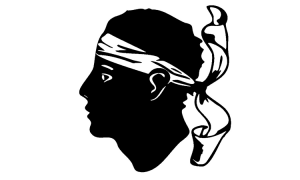Language/Corsican/Grammar/Adjectives
Hi Corsican learners! 😊
In this lesson, we will study Corsican grammar and focus on adjectives. Adjectives are words that describe or modify nouns. Just like in English, they have to agree in gender and number with the noun they are modifying. We will also discuss some cultural aspects of Corsica related to adjective usage. So, let's get started!
Take some time to dive into these other pages after completing this lesson: Plurals, Negation, Personal pronouns & Give your Opinion.
Corsican Adjectives[edit | edit source]
In Corsican, most adjectives come after the noun, but some can come before. Here's an example:
- "Una casa grande" (A big house)
In this case, "grande" (big) is the adjective and "casa" (house) is the noun. Notice how "grande" comes after "casa".
Adjectives can also be used to show possession. In Corsican, the possessive adjective comes before the noun that it modifies:
- "Miu fratellu" (My brother)
In this example, "miu" (my) is the possessive adjective and "fratellu" (brother) is the noun.
To form the plural of an adjective, you usually have to add an "s" at the end of it. However, there are some exceptions, especially with adjectives ending in "u". In those cases, you have to replace the "u" with an "i".
Here are some examples:
| Corsican | Pronunciation | English |
|---|---|---|
| bellu | [bɛllu] | (beautiful) singular masculine |
| bèlla | [bɛllə] | (beautiful) singular feminine |
| bèllichi | [bɛlːik'i] | (beautiful) plural masculine |
| bèlle | [bɛllɛ] | (beautiful) plural feminine |
Sometimes, adjectives can have a different meaning depending on where they are placed in the sentence. For example:
- "Un omu grande hè vistu" (A big man was seen)
- "Un grande omu hè vistu" (A great man was seen)
In the first sentence, "grande" means "big", while in the second one, it means "great".
In Corsican, adjectives can also be used as nouns. In this case, they may change their ending to match their new function. For instance:
- "I zitelli sò bèlli" (The children are beautiful)
- "I bèlli sò sempre preferiti" (The beautiful ones are always preferred)
In the first sentence, "beautiful" is an adjective modifying "children". In the second sentence, "beautiful" is used as a noun, meaning "the beautiful ones". Notice how the ending changes from "-i" to "-e".
Cultural Aspects[edit | edit source]
In Corsica, adjectives are sometimes used as a way to show respect or affection. For instance, people may use different adjectives to address their family members or friends. For example:
- "A me mama cara" (My dear mother)
- "A me fratellu caru" (My dear brother)
In these examples, the word "cara" and "caru" are used instead of the usual possessive adjectives "mia" and "miu" to show affection.
Another interesting aspect of Corsican adjectives is that sometimes they can have a different meaning depending on the region of Corsica. For example, the adjective "maestru" can mean "teacher" in some areas of the island, while in other areas it can mean "master".
Dialogue[edit | edit source]
To help you understand how adjectives are used in Corsican, we have created a dialogue.
- Person 1: "Ai una bèlla casa" (I have a beautiful house)
- Person 2: "Di dov'è a casa toia?" (Where is your house located?)
- Person 1: "Hè in un paese vicinu" (It's in a nearby village)
- Person 2: "È una casa grande?" (Is it a big house?)
- Person 1: "No, hè una casa piccula ma accuggente" (No, it's a small but cozy house)
In this dialogue, you can see how adjectives are used to describe a house and how they agree in gender and number with the noun.
Conclusion[edit | edit source]
In this lesson, we have learned about Corsican adjectives and how they are used in the language, as well as some cultural aspects related to their usage. To improve your Corsican Grammar, you can also use the Polyglot Club website. Find native speakers and ask them any questions!
➡ If you have any questions, please ask them in the comments section below.
➡ Feel free to edit this wiki page if you think it can be improved. 😎
Congratulations on finishing this lesson! Explore these related pages to keep learning: Say Hello and Greetings in Corsican, Pronouns & Future Tense.
Other Lessons[edit | edit source]
- Personal pronouns
- Questions
- Plurals
- Conditional Mood
- How to Use Be
- Give your Opinion
- Negation
- How to Use Have
- Pronouns

